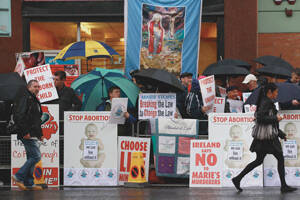The announcement that Marie Stopes International, a London-based family planning charity, would open Ireland’s first abortion clinic, in Belfast, caught Northern Ireland’s politicians by surprise. Northern Ireland has some of Europe’s strictest limitations on abortion, and the procedure is completely outlawed in the Republic of Ireland to the south.
Bishop Noel Treanor, of the Roman Catholic Diocese of Down and Connor, said, “The opening of this facility further undermines the sanctity and dignity of human life in our society, where the most vulnerable and defenseless human beings are already under threat.”
The clinic will function within Northern Ireland’s current legal framework: abortions can be carried out only to preserve the life of the mother or if continuing the pregnancy would have other serious, permanent physical or mental health effects. The clinic will provide services within the first nine weeks of gestation. The clinic’s services will also be available to women from the Republic of Ireland. As many as 4,000 women from the south of Ireland and 1,000 women from the north already travel to Britain annually for abortions, according to the United Kingdom’s Department of Health.
For decades, united resistance from Catholics and Protestants prevented the United Kingdom’s 1967 law legalizing abortion from applying to Northern Ireland, which, unlike the Republic of Ireland in the south, remains a constitutive part of the United Kingdom of Great Britain and Northern Ireland. Some are questioning whether the Irish pro-life community will still be able to unite across sectarian lines, as the pro-life community in the United States has done. A Belfast Telegraph online survey conducted the day the clinic opened found only a slight majority (53 percent) in favor of closing it.
It is widely acknowledged that recent revelations of sexual abuse by members of the clergy have contributed to a precipitous decline in religious affiliation throughout Ireland and have diminished the credibility of church officials. In addition, the growing secularization of Irish society may further compromise the church’s effectiveness in responding to the liberalization of abortion laws. Ireland now ranks among the world’s least religious nations—43rd in the world, just ahead of Vietnam, according to a recent Gallup poll.
Liam Gibson of the Society for the Protection of Unborn Children in Belfast is confident, however, that pro-life forces can come together and even force the closing of the clinic. “It is difficult to see how a compromise with Marie Stopes International could be arrived at,” he said. “The pro-life people of Northern Ireland have fought too hard against the liberalization of their abortion laws and waited too long for the return of accountable government to see a multi-national giant of the abortion industry parachute in from London and sweep aside the law and our devolved institutions.”
There was a strong protest at the opening of the clinic on Oct. 18. The Irish Times writer, author and pro-choice supporter Fintan O’Toole called the “virulent opposition” to the opening of the clinic “strange,” pointing out that most people in Northern Ireland “don’t seem particularly upset that women can travel a short distance within [the United Kingdom] and have an abortion much more freely. “There seems to be some visceral feeling that abortion is especially terrible if it happens on sacred Irish soil,” he said. He added that after cultural defeats on contraception and divorce, abortion may prove to be a “line in the sand” issue for Ireland’s cultural conservatives.








